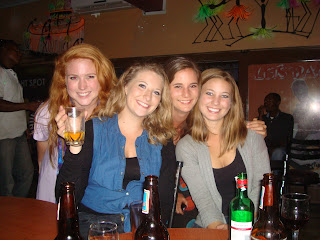The
villages I’ve been in over the past few weeks are predominately Maasai. Maasai
is a tribe with a large presence in and around the Arusha area of Tanzania. Out
of all the tribes here, I find Maasai the most interesting, partly because
their culture is so different from mine.
Their livelihood revolves around their cows. They value their cows very highly not because they worship them but because of the milk, manure, and meat that they produce. Wealth is measured in cows: the more cows one has, the more prestige that person holds in the community. Even brides wealth is paid in cows!
 Coming of age is a very important part in a Maasai man’s life and involves several steps. As explained to me by our Maasai intern Hagael, first the boy (who may be between the ages of approx. 14-18) must ask his father for permission to be circumcised. If permission is granted, he must then prove his strength by catching a bull and tying its legs together. After this, the boy must go to his grandfather for his blessing, and then he can be circumcised. The circumcision is done using no anesthetics, but if the boy cries or shows signs of weakness during the ceremony he brings great shame upon himself and his family. I cringe every time I see a Maasai boy all in black, because his clothing indicates that he has recently been circumcised and is still healing.
Coming of age is a very important part in a Maasai man’s life and involves several steps. As explained to me by our Maasai intern Hagael, first the boy (who may be between the ages of approx. 14-18) must ask his father for permission to be circumcised. If permission is granted, he must then prove his strength by catching a bull and tying its legs together. After this, the boy must go to his grandfather for his blessing, and then he can be circumcised. The circumcision is done using no anesthetics, but if the boy cries or shows signs of weakness during the ceremony he brings great shame upon himself and his family. I cringe every time I see a Maasai boy all in black, because his clothing indicates that he has recently been circumcised and is still healing. Although I have yet to experience it (since our trainees are generally hard-working), I have heard that Maasai men are very lazy and that their only daily task is to take the cows in at night. Women do the cooking, cleaning, child-rearing; they fetch the water, gather firewood, and of course cater to their husband’s every need. It’s not uncommon for the lucky man to have several wives to do this work for him, although I’m told that polygamy is becoming less prevalent in Maasai culture.
Although I have yet to experience it (since our trainees are generally hard-working), I have heard that Maasai men are very lazy and that their only daily task is to take the cows in at night. Women do the cooking, cleaning, child-rearing; they fetch the water, gather firewood, and of course cater to their husband’s every need. It’s not uncommon for the lucky man to have several wives to do this work for him, although I’m told that polygamy is becoming less prevalent in Maasai culture.Due to their value of cows, a meal of milk and beef is often considered a good Maasai dinner. Unfortunately there is a belief in Maasai culture that fruits are for children and the weak/ill, so they are not consumed as commonly as they should be, contributing to malnutrition. Also, in general Maasai just don’t like vegetables (the Maasai word for green veggies like lettuce and spinach actually translates to “grasses”) so they are lacking in that food group as well.

The Maasai wardrobe is very interesting. The men wear “Maasai blankets” which are rectangular pieces of red, blue, or purple plaid cloth. They generally wrap one around the waist and one around the chest, and sometimes wear a third one like a cape. The women may also have a Maasai blanket handy to carry their babies on their backs. Most women wear a khanga wrap and lots of elaborate bead jewelry. Both men and women have stretched earlobes with large holes through them… I must admit it was hard not to stare during the first week I worked with them (even though I get stared at whenever I’m in public).
As
for my vacation week, it was absolutely fantastic. Actually it couldn’t have
been better. I got to hang out with my Dad last weekend! It was soooo nice to
get to show him around my temporary home. We took a long tour of downtown
Arusha on foot looking for soccer balls. My Dad made it a mission to buy soccer
balls for a school down the road because he had seen the kids playing soccer
with a bundle of rags during recess. The mission was accomplished! We also went
on a safari, which even Dad appreciated despite his dislike of animals!
I
don’t think I have to even tell you that Zanzibar was amazing. I’m not even
ashamed to say that I spent all my time by the pool and on the beach (and not
doing any kind of work whatsoever) because you would’ve done the same!! The
scenery was breathtaking and the weather was perfect all week. It was really hard to come back home!
This
week I’ll be in Arusha finishing up my last week of sustainable agriculture
training, then I’ll be starting HIV/AIDS trainings!













